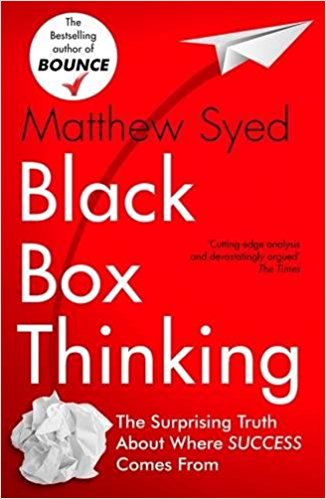Black Box Thinking, or Learning from Failure
06/09/2017


We were just reflecting at the latest Round Table on Matthew Syed’s book “Black Box Thinking” (2015, John Murray Publishing, London) and in particular on learning from failure.
So what I have done here is pull out some of the lessons which are really relevant for organisational learning. Syed compares the learning culture of the US Health Care Industry with the Aviation Industry and talks a lot about transparency, openness, reporting and the opportunity to learn from mistakes. The quote I really love is from Sullenberger (page 44) reflecting on his UA Airways Flight in 2009 which he “successfully” landed in the Potomac River after losing all his engines in a bird strike.
“Everything we know in aviation, every rule book, every procedure we have, we know because someone, somewhere died … We have purchased at great cost, lessons literally bought with blood that we have to preserve as institutional knowledge and pass on to succeeding generations. We cannot have the moral failure of forgetting these lessons and have to relearn them.”
Syed also talks about organisations being open to learning or not.
“For our purpose, a closed loop is where failure doesn’t lead to progress as information on errors or weaknesses is misinterpreted or ignored; an open loop does lead to progress because the feedback is rationally acted upon.” (page 15)
From the book we also distilled a list of reasons why organisations don’t learn.
- Lack of failure
- Sometimes caused because you haven’t failed
- Sometimes caused because you play safe so avoid failure
- Blame culture
- Feedback
- Speed of feedback – the faster the better
- Clarity of feedback – so you can’t fudge the issue
- Granularity of the evidence – ditto
- Lack of retrospective review – do you do post investment reviews?
- Hierarchy
- A problem is when knowledge is handed down not discovered
- Culture of “inconvenient evidence”
- Top down v bottom up learning
- Language of a profession
- Is it an Error or complication? If the latter, you are obfuscating the fact a failure occurred
- Limit of an investigation
- Ask the “5 Whys”
And finally, some challenging questions to ask yourself about whether or not you learn as an individual. Syed’s comment is if you answer no to any of the following, then you are not open to learn!
- Do you fail in your judgements?
- Do you ever get access to the evidence that shows where you might be going wrong?
- Are your decisions ever challenged by objective data?
Mike Bourne
Categories & Tags:
Leave a comment on this post:
You might also like…
Company codes – CUSIP, SEDOL, ISIN…. What do they mean and how can you use them in our Library resources?
As you use our many finance resources, you will probably notice unique company identifiers which may be codes or symbols. It is worth spending some time getting to know what these are and which resources ...
Supporting careers in defence through specialist education
As a materials engineer by background, I have always been drawn to fields where technical expertise directly shapes real‑world outcomes. Few sectors exemplify this better than defence. Engineering careers in defence sit at the ...
What being a woman in STEM means to me
STEM is both a way of thinking and a practical toolkit. It sharpens reasoning and equips us to turn ideas into solutions with measurable impact. For me, STEM has never been only about acquiring ...
A woman’s experience in environmental science within defence
When I stepped into the gates of the Defence Academy it was the 30th September 2019. I did not know at the time that this would be the beginning of a long journey as ...
Working on your group project? We can help!
When undertaking a group project, typically you'll need to investigate a topic, decide on a methodology for your investigation, gather and collate information and data, share your findings with each other, and then formally report ...
From passion to purpose: My journey at the Pinnacle of Aviation
By: Sultana Yassin Abdi MSc Air Transport Management, Current Student Born and raised in the vibrant landscape of the UAE, with roots stretching back to Somalia, my life has always been ...







Mike, Some very good comments and observations here that complement the book review we did late last year. You see these sorts of failures every day – just last night I was watching the News and the report was about the plight of the Rohingya Muslims being subjected to genocide or clear out by the regime in Myanmar, and the relatively new President Aung San Suu Kyi (thought of as a saviour of human rights) essentially denying it is happening.